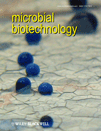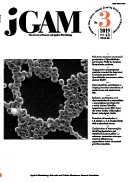
Microbial Biotechnology
Scope & Guideline
Fostering collaboration in the realm of microbial sciences.
Introduction
Aims and Scopes
- Microbial Metabolism and Engineering:
Research emphasizes the metabolic pathways of various microorganisms, including bacteria and fungi, and their engineering for enhanced production of biofuels, bioplastics, and biochemicals. - Bioremediation and Environmental Applications:
The journal publishes studies on the use of microbes for bioremediation of pollutants, including plastics, heavy metals, and organic contaminants, showcasing innovative strategies for environmental restoration. - Microbial Interaction and Ecosystem Dynamics:
Understanding interactions among microbial communities and their effects on ecosystems, particularly in soil and plant microbiomes, is a significant focus, highlighting symbiotic relationships and community dynamics. - Synthetic Biology and Genetic Engineering:
Research here includes the development of synthetic biology tools and techniques, such as CRISPR technology, to manipulate microbial genomes for improved functionality and product yield. - Health and Probiotics:
The journal explores the role of microbes in human health, including the gut microbiome's influence on disease, nutrition, and the development of probiotics for therapeutic applications. - Innovative Biotechnological Applications:
Studies on the application of microorganisms in agriculture, food production, and pharmaceuticals, emphasizing novel uses such as biocontrol agents and microbial-derived compounds.
Trending and Emerging
- Microbial Plastic Degradation:
There is a rising emphasis on the microbial degradation of plastics, particularly PET, reflecting global concerns about plastic pollution and the search for sustainable solutions. - Synthetic Microbial Consortia:
The development and application of synthetic microbial consortia for various biotechnological applications are trending, highlighting the importance of collaborative dynamics in microbial communities. - Machine Learning in Microbial Research:
The integration of machine learning techniques for analyzing microbial data and enhancing strain development is emerging as a significant theme, indicating a tech-forward approach to microbial biotechnology. - Biological Carbon Capture and Utilization:
Research into using microbes for carbon capture and conversion into valuable products is gaining momentum, aligning with global climate action goals. - Health Implications of the Microbiome:
Exploration of the microbiome's role in health and disease, particularly concerning metabolic disorders and gut-brain interactions, is increasingly prominent. - Innovative Biocontrol Strategies:
There is a growing interest in utilizing microbial agents for biocontrol in agriculture, emphasizing sustainable practices and reducing chemical pesticide reliance.
Declining or Waning
- Traditional Antibiotic Research:
Research focused solely on traditional antibiotic compounds has seen a decline as newer avenues such as phage therapy and antimicrobial resistance mechanisms gain traction. - Basic Microbial Taxonomy:
Studies primarily aimed at classifying and naming new microbial species are less frequent, reflecting a shift towards functional and applied microbiology research. - Single Microbial Strain Studies:
The focus on single-strain studies is decreasing in favor of research involving complex microbial consortia and their interactions, which are more reflective of real-world ecosystems. - Conventional Fermentation Processes:
Research on conventional fermentation processes without innovative engineering or optimization strategies is waning, as there is a growing emphasis on metabolic engineering and synthetic biology.
Similar Journals

JOURNAL OF BIOSCIENCE AND BIOENGINEERING
Advancing the frontiers of bioscience and engineering.The JOURNAL OF BIOSCIENCE AND BIOENGINEERING, published by the SOC BIOSCIENCE BIOENGINEERING JAPAN, is an esteemed peer-reviewed journal dedicated to advancing knowledge in the fields of applied microbiology, biotechnology, and bioengineering. With its ISSN of 1389-1723 and E-ISSN 1347-4421, this journal has been providing a platform for innovative research since its inception in 1991, maintaining its relevance through periodic updates and a scope that encompasses various aspects of bioscience and engineering. The journal boasts a notable impact factor, reflecting its contributions to the Q2 and Q3 quartiles in relevant categories as of 2023, which positions it amongst the well-regarded publications in its field. Researchers and professionals can access its rich archive through open access options, ensuring wide dissemination of pivotal studies. With its address rooted in Osaka University, Japan, the journal serves as a vital resource for scientists and scholars committed to pushing the boundaries of biosciences and engineering.

ANNALS OF MICROBIOLOGY
Fostering collaboration in cutting-edge microbiological research.ANNALS OF MICROBIOLOGY is a prestigious journal dedicated to advancing the field of microbiological research, published by BMC, renowned for its commitment to providing open access to vital scientific findings. With its ISSN 1590-4261 and E-ISSN 1869-2044, this journal provides a platform for the dissemination of high-quality research since its inception in 1997. Renowned for its rigorous peer-review process, it has attained a commendable Q2 ranking in the Applied Microbiology and Biotechnology category in 2023, reflecting its significant contributions to the discipline. Positioned within the 67th percentile among its peers in Scopus rankings, ANNALS OF MICROBIOLOGY continues to facilitate the exchange of innovative ideas and methodologies, serving as an essential resource for researchers, professionals, and students alike. The journal covers a broad spectrum of topics, emphasizing the intersection of microbiology with applied sciences, thereby fostering an environment that encourages collaboration and advancement in this vital field. Scholars seeking to stay at the forefront of microbiological studies will find ANNALS OF MICROBIOLOGY an invaluable addition to their academic pursuits.

JOURNAL OF MICROBIOLOGY AND BIOTECHNOLOGY
Pioneering Research in Microbial and Biotechnological SciencesJOURNAL OF MICROBIOLOGY AND BIOTECHNOLOGY, published by the Korean Society for Microbiology and Biotechnology, is a premier academic journal based in South Korea that has been at the forefront of advancing knowledge in the fields of microbiology, biotechnology, and their applied sciences since its inception in 1991. This journal holds a commendable Q2 quartile ranking in key categories, including Applied Microbiology and Biotechnology, showcasing its significant impact within the academic community. With an emphasis on high-quality, peer-reviewed research, the journal aims to disseminate innovative findings that foster deeper understanding and advancements in microbial and biotechnological sciences. Researchers, professionals, and students utilize this journal to stay informed about contemporary developments and to inspire future investigations. Although it is not an open-access journal, its content is accessible through various academic libraries and databases, providing a vital resource for those engaged in cutting-edge research.

JOURNAL OF INDUSTRIAL MICROBIOLOGY & BIOTECHNOLOGY
Advancing the Frontiers of Industrial Microbiology and BiotechnologyJOURNAL OF INDUSTRIAL MICROBIOLOGY & BIOTECHNOLOGY, published by Oxford University Press, is a vital resource for researchers and professionals actively engaged in the fields of applied microbiology, biotechnology, and bioengineering. With an ISSN of 1367-5435 and E-ISSN of 1476-5535, this journal has established itself as a leading platform for disseminating innovative research findings and advancing knowledge in industrial microbiology since its inception in 1996. As of 2023, it is classified in the Q2 quartile across multiple categories including Applied Microbiology and Biotechnology, Bioengineering, and Medicine, underscoring its significance in the academic community. Notably, it ranks 26th of 127 in Applied Microbiology and Biotechnology, placing it in the 79th percentile, indicative of its high impact and influence. Although it does not currently offer Open Access, it remains a key outlet for high-quality scholarly articles that align with the objectives of improving industrial practices through biotechnological applications. For those interested in the latest developments and methodologies within the realm of applied microbiology and biotechnology, this journal serves as an indispensable reference.

FOLIA MICROBIOLOGICA
Pioneering Discoveries for a Healthier Tomorrow.FOLIA MICROBIOLOGICA is a distinguished academic journal published by SPRINGER, focusing on the intricate realms of microbiology and its contributions to medicine. Since its inception in 1957, the journal has been a vital platform for disseminating pioneering research, addressing contemporary challenges in the field while facilitating discourse among researchers, clinicians, and students alike. With an ISSN of 0015-5632 and an E-ISSN of 1874-9356, FOLIA MICROBIOLOGICA publishes original articles, reviews, and critical insights that span not only traditional microbiological studies but also innovative applications in immunology and biotechnology. The journal is categorized within the esteemed Q2 tier in Medicine (Miscellaneous) and holds a Q3 rating in Microbiology as of 2023, reflecting its significant impact and relevance in the scientific community. Although it does not currently offer open access, it remains a respected resource, enabling professionals and students to keep abreast of advancements from its base in the Netherlands. With a strong commitment to quality and rigorous peer-review, FOLIA MICROBIOLOGICA serves as an essential repository of knowledge, fostering the next generation of microbiologists and medical practitioners.

Microorganisms
Advancing the frontiers of microbiological research.Microorganisms is a leading open-access journal published by MDPI based in Switzerland, catering specifically to the rapidly evolving fields of microbiology and virology. Since its inception in 2013, the journal aims to foster the dissemination of high-quality research through its comprehensive and interdisciplinary platform, with a particular focus on both fundamental and applied microbiological sciences. Contributing to its esteemed reputation, Microorganisms holds a commendable Q2 ranking in the categories of Microbiology and Virology, as well as in Medical Microbiology, highlighting its significance in the academic community. With a consistent impact, evidenced by its rankings in Scopus—such as rank #25 in Virology and #56 in Microbiology—the journal serves as an invaluable resource for researchers, professionals, and students looking to stay at the forefront of microbiological research. As an open-access journal, Microorganisms ensures that vital research findings are readily available to a global audience, promoting collaboration and innovation in the study of microbial life and its implications for health and disease.

APPLIED BIOCHEMISTRY AND MICROBIOLOGY
Fostering Knowledge in the Dynamic Fields of Biochemistry and Microbiology.Applied Biochemistry and Microbiology is an esteemed journal published by Pleiades Publishing Inc, focusing on the intricate intersections of biochemistry and microbiology. Established in 1970, with a commitment to advancing scientific knowledge, this journal serves as a vital platform for disseminating innovative research findings in applied microbiology, biotechnology, and biochemistry. With its ISSN 0003-6838 and E-ISSN 1608-3024, the journal operates from its base in New York, USA. As a recognized publication in the field, Applied Biochemistry and Microbiology holds a Category Quartile ranking of Q3 in Applied Microbiology and Biotechnology and Q4 in Biochemistry, reflecting its significant contributions and relevance. Although currently not open access, the journal is indexed in Scopus, with respectable rankings that highlight its impact in the community, making it a pivotal resource for researchers and professionals dedicated to the realms of biochemistry and microbiology.

INDIAN JOURNAL OF MICROBIOLOGY
Innovating Solutions Through Microbial ResearchINDIAN JOURNAL OF MICROBIOLOGY, published by Springer, serves as a vital platform for the dissemination of cutting-edge research in the field of microbiology. With an ISSN of 0046-8991 and an E-ISSN of 0973-7715, this esteemed journal invites contributions that span various disciplines within microbiology, encompassing both fundamental studies and applied research that can impact health, environment, and industry. Recognized in the Q3 category in Microbiology for 2023, and ranking #80 out of 182 in Scopus’ Microbiology category, it reflects its commitment to quality and significance in the academic community. Authors and researchers benefit from the journal's comprehensive review process, which enhances the visibility and reach of their work. While no open access options are currently offered, the INDIAN JOURNAL OF MICROBIOLOGY remains a premier choice for those aiming to contribute to the ongoing dialogue in microbiological studies, ensuring that knowledge continues to evolve and thrive.

JOURNAL OF GENERAL AND APPLIED MICROBIOLOGY
Innovating biotechnology through rigorous microbial research.JOURNAL OF GENERAL AND APPLIED MICROBIOLOGY, published by the MICROBIOL RES FOUNDATION, is a vital resource in the fields of applied microbiology and biotechnology, as well as in diverse medical applications, serving an academic community dedicated to advancing microbial science. Established in 1955, this journal has a rich history of disseminating innovative research and insights into the intricate world of microorganisms. With an ISSN of 0022-1260 and an E-ISSN of 1349-8037, the journal maintains high scholarly standards and robustness, reflected in its 2023 Scopus rankings placing it in the Q3 and Q4 quartiles within its categories. While primarily based in Japan, the journal engages a global audience, offering valuable contributions that inform both theoretical perspectives and practical applications in microbiology. Despite being a non-open-access publication, it provides pivotal research findings essential for academics, professionals, and students alike, fostering a deeper understanding of microbial impact on health and the environment.

BIOTECHNOLOGY LETTERS
Innovating Solutions for Tomorrow's ChallengesBIOTECHNOLOGY LETTERS is a prestigious peer-reviewed journal that has been at the forefront of biotechnology research since its inception in 1979. Published by Springer, this esteemed journal serves as a vital platform for disseminating cutting-edge research in the fields of applied microbiology, bioengineering, and biotechnology, with a focus on innovative methodologies and technologies. With an impact factor reflecting its critical contribution to the discipline, BIOTECHNOLOGY LETTERS resides in the Q2 and Q3 tiers of various scientific categories, placing it among the notable journals in the biotechnological landscape. Although it offers traditional access options and does not feature open access, the journal embraces a global readership, encouraging submissions from researchers, professionals, and students eager to explore the dynamic advancements in biotechnology. Situated in the Netherlands, it continues to shape the future of the field through relevant, impactful research that addresses contemporary challenges and opportunities in medicine and beyond.